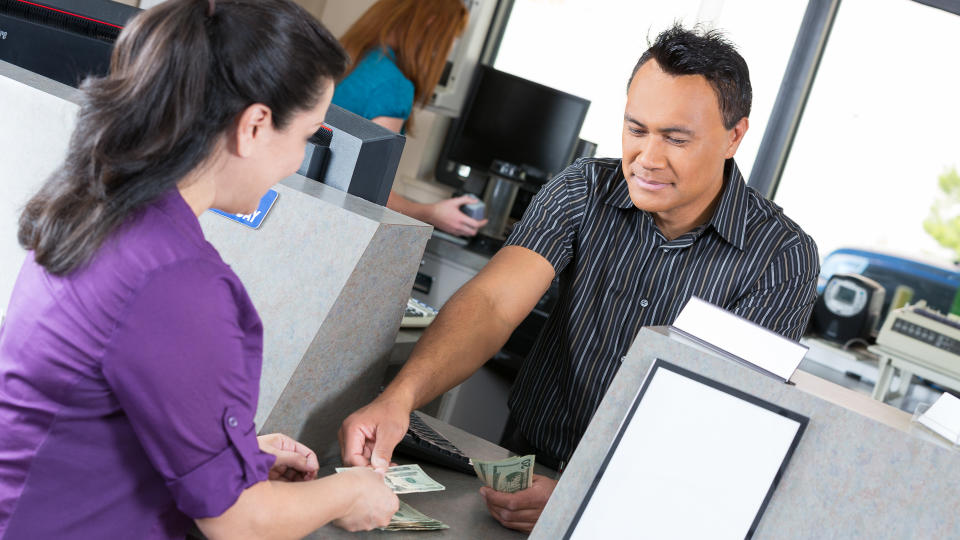I’m a Bank Teller: 7 Reasons You Should Never Deposit More Than $10K at Once

Money and where to store it can be confusing. That’s why GOBankingRates spoke with bank teller Rachael P., who has firsthand experience with how people interact with money — especially how they deposit it in a bank. She shared that customers shouldn’t deposit more than $10,000 in any one transaction. “There’s really no upside to making big cash deposits like that,” she said. “It’s better for the customer to make smaller, more frequent deposits.”
Rachael outlines seven key reasons why you should never deposit over $10,000 in cash at one time.
Discover More: How Can You Withdraw Money From a Bank Account? 3 Ways To Know
Trending Now: 4 Genius Things All Wealthy People Do With Their Money
It Triggers a Currency Transaction Report
“If a customer tries to deposit $10,000 or more in cash, we’re required by law to complete a Currency Transaction Report,” Rachael said. This report details the customer’s identity, Social Security number, address and other personal information that gets submitted to the federal government. “It’s a hassle customers can easily avoid by breaking up their deposits into amounts under $10,000.”
Read Next: I’m a Bank Teller: 9 Reasons You Should Never Ask for $2 Bills From the Bank
It Raises Suspicion
Even if the cash is legitimate, making a large deposit gives the impression the money could be ill-gotten. “We have to be hypervigilant about deterring any potential money laundering activity,” Rachael said. Large deposits trigger internal bank reviews that might require investigation. “It’s just not worth the questioning and possible legal issues.”
It Can Delay Deposits
Once a Currency Transaction Report needs filing, it delays when bank tellers can complete the deposit. “I have to locate the proper forms, get the required customer info and fill out additional paperwork,” Rachael shared. “So rather than an immediate deposit, the cash gets secured until all reporting is done, which can take hours or even a day.”
It Makes the Bank Riskier
Keeping tens of thousands of dollars in cash on hand makes the bank a bigger target for robbery. “Banks have cash limits on how much we can store, so a $30,000 deposit makes us go over that threshold and become a security risk,” Rachael said. “It’s much safer for us, and our customers, if big cash deposits are avoided.”
It Could Be Seized
In extreme situations, if the bank suspects illegal activity, large cash deposits may be seized by the federal government while an investigation is conducted. “No one wants to jeopardize their life savings over a cash deposit,” Rachael shared. Keeping deposits smaller makes it easier to avoid complicated legal scenarios.
It Gets Reported to the IRS
All Currency Transaction Reports get filed directly with the IRS, regardless of whether criminal activity is suspected. “The IRS combs through these reports hunting for any irregularities in a person’s wealth or income,” Rachael said. Dealing in amounts under $10,000 prevents any unwanted inquiries from the IRS.
It Forces ‘Know Your Customer’ Procedures
When large cash deposits occur, extra steps are required to verify the customer’s identity and source of funds per “know your customer” banking regulations. “We need to be certain the money isn’t connected to anything nefarious,” Rachael shared. “While most customers are honest, we can’t take any chances when significant cash is involved.”
Between redundant paperwork, security risks, legal obligations and tax implications, Rachael stressed there’s no upside to depositing over $10,000 at a time. “It’s a completely avoidable headache if you make smaller, more frequent deposits under $10,000,” she said.
More From GOBankingRates
This article originally appeared on GOBankingRates.com: I’m a Bank Teller: 7 Reasons You Should Never Deposit More Than $10K at Once

 Yahoo Finance
Yahoo Finance 